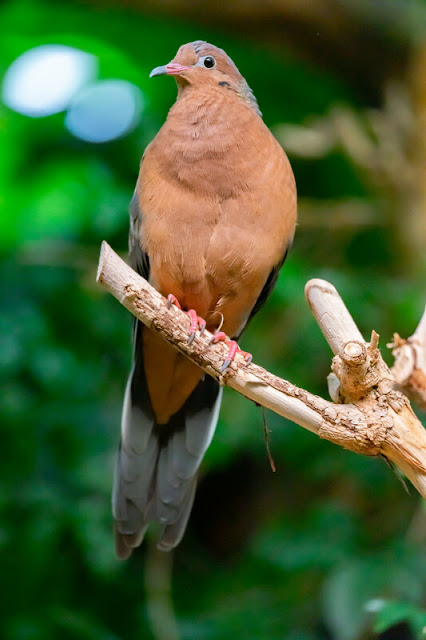Posted by Kayla Hanada, Animal Keeper
with Elizabeth Bacher, Communications
Hello! My name is Kayla and I am an animal keeper at Woodland Park Zoo working primarily in our bird areas. If you’ve visited recently and walked through the dome in the Tropical Rainforest building, you’ve likely seen (or heard) two of our newest residents—Socorro doves! These special birds—named Bill and Ted—came to us from the San Diego Zoo a few months ago and they have quite the personalities. They’ve warmed up to their new home fairly quickly and I often hear them cooing in the trees. I’ve even seen them landing on the railings of the dome’s elevated walkway, not too far away from guests. These are both behaviors that show us they’re feeling comfortable here. The best time for you to spot them might be when we change their food bowls out, which is first thing in the morning right around the time we open at 9:30 and again later in the afternoon before we close. They do love their meals and snacks, which consist of a mixture of fruit salad, pellets, greens, and a seed mix!
with Elizabeth Bacher, Communications
 |
| The Socorro dove is extinct in the wild. Photo: Annie Kwan/Woodland Park Zoo |
Hello! My name is Kayla and I am an animal keeper at Woodland Park Zoo working primarily in our bird areas. If you’ve visited recently and walked through the dome in the Tropical Rainforest building, you’ve likely seen (or heard) two of our newest residents—Socorro doves! These special birds—named Bill and Ted—came to us from the San Diego Zoo a few months ago and they have quite the personalities. They’ve warmed up to their new home fairly quickly and I often hear them cooing in the trees. I’ve even seen them landing on the railings of the dome’s elevated walkway, not too far away from guests. These are both behaviors that show us they’re feeling comfortable here. The best time for you to spot them might be when we change their food bowls out, which is first thing in the morning right around the time we open at 9:30 and again later in the afternoon before we close. They do love their meals and snacks, which consist of a mixture of fruit salad, pellets, greens, and a seed mix!
 |
| Say hello to Bill and Ted! Photo: Annie Kwan/Woodland Park Zoo |
Socorro doves are actually extinct in the wild, so it is quite a thrill to the bird keeper team to have them with us! They were endemic to the Mexican island of Socorro off Mexico’s west coast—which means they were native to only that one place. Mexico developed the island to build a naval base there in the 1950s—and along with development people unknowingly brought some species with them that caused a lot of damage to the island’s native wildlife. Sheep, which were used for food, wool and other products, competed with the doves for space in the grassy areas where the doves lived and got their food. Domestic cats, which were brought to the island as pets, hunted native wildlife and nearly wiped out the dove population.
Since then, conservationists decided that the surviving doves needed to be taken into human care where they could breed with others already residing at several zoos. This was the best way to prevent their total extinction. As of right now, there are only 156 Socorro doves left in the world, so each bird is very important and we are so lucky to have them here. This whole group of birds now makes up the breeding program managed by the Association of Zoos and Aquariums (AZA) to help ensure the survival of a healthy, self-sustaining population of Socorro doves.
There is a plan in place to possibly reintroduce this species back to their island sometime in the future, but it is dependent on first being able to control the populations of sheep and cats there, as well as restoring more of their native habitat. I, personally, would be so excited to be part of that program. Helping to save species is important to Woodland Park Zoo’s mission, and taking part in a reintroduction program is something I have always wanted to do! Our two doves are not part of the conservation breeding population right now (we don’t have females to pair them with yet) but we are hoping to welcome some in the future—and then these birds will hopefully be part of that program that is literally saving their species!
 |
| Photo: Jeremy Dwyer-Lindgren/Woodland Park Zoo |
For any movie buffs out there (or just anyone who strives to be “excellent”) you may have noted the special names of our two males—Bill and Ted. Why did we choose these names? Because, of course, these two birds are totally excellent, but also because they’re very sweet and good-natured—like their namesakes. They also like making music and, as the last movie showed, they are very rare. I've fallen in love with them and I hope you do too! We’ll look forward to seeing you when you come visit them, and all the birds, in the dome of the Tropical Rainforest Building.



Comments
Post a Comment